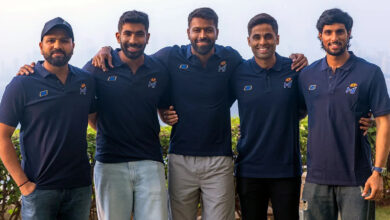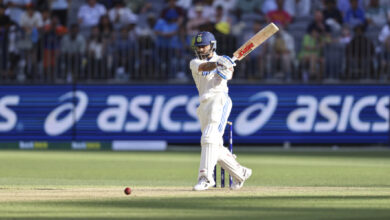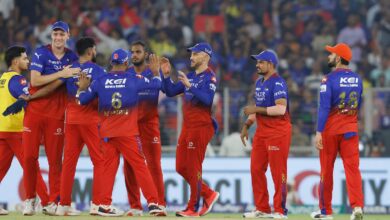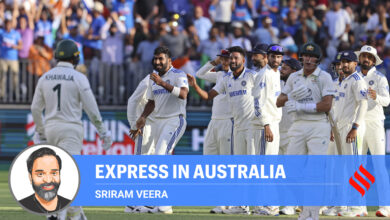World Cup gets a Blue tick: A day after Saudi stun Argentina, Japan slay mighty Germany to light up the tournament

Cushioning a floated pass with a deft first touch, Takumi Asano skittered down the right flank. He cut into the six-yard box and saw the imposing German centre-back Nico Schlotterbeck, all of six-feet-two inches, barging into him. But the five-foot-five winger out-barged him, regained the ball that had bobbled away from his feet, took a couple of yards and seconds to weigh in his options, gather his balance, and then fired in a guillotine shot past the near post of Manuel Neuer, the king of goalkeeping in this era. The 83rd-minute goal, which sparked wild celebrations among thousands of fans that had descended at the Khalifa Stadium, turned match-winner, wrapping up a famous upset win for Japan over Germany, one of the tournament favourites.
It could potentially be the greatest ever goal in the hory of Japan football, just as the 2-1 comeback win could be the biggest upset yet in their hory. The Samurai Blue are not pushovers, thrice have they reached the Round of 16, including the previous edition, where they ran Belgium close, but eventually lost 2-3. But they have struggled to harness the speed and suppleness the players possess. This, though, could be the catalyst of change.
The script was eerily similar to Saudi Arabia’s upending of Argentina. Germany dominated the first half, and on another day could have doubled or tripled their lead on either side of Ilkay Gundogan’s 33rd-minute strike. But the Germans were unusually profligate, hampered the absence of a classical striker in the mould of Miroslav Klose or Jurgen Klinsmann.
Japanese commentary for Japan’s winning goal#JapanvsGermany #GERvsJPN #WorldcupQatar2022 pic.twitter.com/MCVfiQVidf
— Ralph Cifaretto 🇪🇺🇺🇸🇫🇮🇺🇦 (@RaIph_Cifaretto) November 23, 2022
They hatched chances, but the execution lacked finesse. Just before the first goal, Gundogan himself shot twice at the goal in the space of a minute. The goalkeeper Shiuchi Gonda was summoned to last-gasp saves several times in the opening half an hour. But somehow, he clawed, pawed and poked the ball away from the net. The clumsy challenge that culminated in the spot kick was the only aberration.
The saves would eventually turn invaluable for Japan. But a comeback seemed a far-fetched prospect as the minutes continued to trickle down. In desperate pursuit of an equaliser, Japan coach Hajime Moriyasu, a rugged defender at his peak, substituted four players in the space of 17 minutes.
One of them was Asano (57) and the other was Ritsu Doan (71). The latter made the first decisive intervention. Just four minutes after introducing, he was perfectly positioned to slot home the rebound off Neuer’s save off Takumi Minamino’s (another substitute) shot. Doan just had to keep his composure and beat Neuer, who was just spreading his left arm to block the shot. But Doan was not to spill what could be the goal of his life.
Like Argentina, Hansi Flick’s side seemed a touch rattled, an unusual German trait. Soon after, they could have conceded a second goal, as the usually composed defender Antonio Rudiger hacked Doan down inside the box. The referee, though, refused the penalty. Frazzled, they threw the entire kitchen sink on Japan, in the process leaving spaces behind, making them vulnerable to counterattacks.
Japan did just that. And then, in the 83rd minute, Asano struck, launching delirium among his colleagues and in the stands. And perhaps in Japan too. A winger with dancer’s feet, he is aptly called the Jaguar for his pace and stealth, both gifts the defeated Germans would readily attest. For many Germans, Asano is a familiar figure as he plays for the Bundesliga side Bochum. So would most of his colleagues – nine of the 26-member squad represented German clubs.
Germany had the firepower to retaliate, to at least redeem a point. They pressed and passed forward, but withered in the iron-willed resance of the blue Japanese human wall. They flung their bodies and lunged their boots to keep their date with destiny. And when that horic moment arrived, they slipped into a happy pandemonium. The entire dugout poured onto the ground and piled onto the eleven players. Beside them, the Germans looked forlornly. Memories of the last edition, where they crashed out in the group stage, would have whirled around them.
Whether Germany and Argentina, the finals of the 2014 World Cup, bounce back or not, the tournament has been lit up an underdog uprising, the most romantic of World Cup script. While Japan are a more lethal side than Saudi Arabia—Flick had dwelled on Japan’s attacking verve in his pre-game presser—the gulf of quality and fame between them and Germany was wide as the Persian Gulf. Japan’s most recognised talents are Arsenal’s Takehiro Tomiyasu and ex-Liverpool forward Takumi Minamino, whereas Germany has an assembly of footballers the world covets. But the first round of the World Cup has turned out to be a scourge for the Goliath teams of the world.







